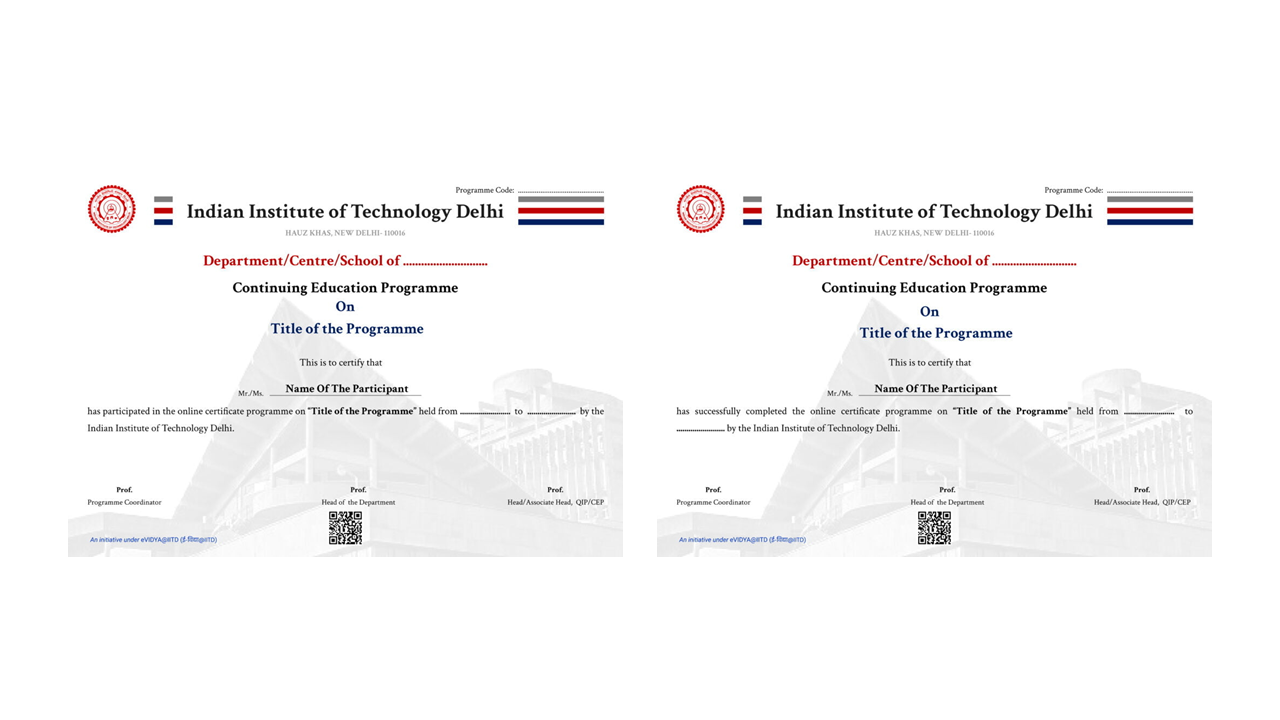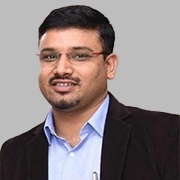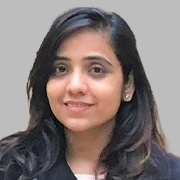
- Course Duration
6 months
- Batch
02
- Mode
Live Online
- Commencement Date
June 29, 2025 (Academic Orientation)
- Application Closure Date
Closed
- Session Timings
Saturday from 4:00 PM to 6:00 PM
Admission Criteria

- Bachelor’s degree in Science or Engineering or Medical fields (MBBS/Pharmacy / Nursing/ BDS or equivalent degree) with atleast 50% marks in total or 5.0 CGPA.
Screening & Selection Criteria
- Screening and selection will be done by IIT Delhi.
Assessment Criteria
- Assignments
- Live Online
- Projects
- Term Papers
Attendance
- Minimum 70% of attendance is mandatory.
About IIT Delhi
Indian Institute of Technology Delhi is one of the Twenty-Three IITs created to be Centres of Excellence for Training, Research and Development in Science, Engineering and Technology in India. Established as College of Engineering in 1961, the Institute was later declared as an Institution of National Importance under the “Institutes of Technology (Amendment) Act, 1963” and was renamed as “Indian Institute of Technology Delhi”. It was then accorded the status of a Deemed University with powers to decide its own academic policy, to conduct its own examinations, and to award its own degrees.
Since its inception, over 48000 have graduated from IIT Delhi in various disciplines including engineering, physical sciences, management and humanities & social sciences of these, nearly 5070 received PhD Degrees. The number of students who graduated with B.Tech Degrees is over 15738. The rest obtained Master’s Degrees in engineering, sciences and business administration. These alumni today work as scientists, technologists, business managers and entrepreneurs. There are several alumni who have moved away from their original disciplines and have taken to administrative services, active politics or are with NGOs. In doing so, they have contributed significantly to building of this nation and to industrialisation around the world. For more details, please visit: www.iitd.ac.in.

Pedagogical Methodology
Learning Outcomes
Hear from our Participants
Admission Process
- 1
Eligibility of Applicant
- 2
Application Submission
- 3
Screening & Shortlisting
- 4
Admission & Fee Payment
- 5
Book your Seat
Unleash the benefits that await you with Jaro Value adds.
%
higher employee retention rate
%
increase in employee productivity
%
higher incomes per employee
%
businesses achieved measurable growth
Companies that already trust us!
Syllabus Breakdown
- Human Physiology: The study of how the human body works, including cells, tissues, organs, and systems.
- Healthcare Fundamentals: The basic principles of healthcare, such as anatomy, physiology, and pharmacology.
- Human Biomechanics: The study of the mechanical properties of the human body and how they affect movement, including the musculoskeletal system, biomechanics of gait, and biomechanics of sports.
- Space Biomechanics: The study of the effects of the space environment on the human body, including microgravity, radiation, and isolation.
- Patient flow management and facility planning and layout : Planning and coordinating the movement of patients through the healthcare system.
- Resource management and Capacity planning for hospitals : Ensuring that the right resources are available to the right patients at the right time, including staff, equipment, and supplies. Capacity planning for hospitals, Inventory management.
- Quality improvement : Implementing processes to improve the quality of care, including patient safety, patient satisfaction, and clinical outcomes.
Note: This is an indicative list of course topics and is subject to change as per IIT Delhi’s discretion.
- Pharmacokinetics : The study of how drugs are absorbed, distributed, metabolized, and eliminated by the body.
- Pharmacodynamics : The study of how drugs interact with the body to produce an effect.
- Drug delivery systems : The route-specific delivery, recent strategies, biomedical polymers and sustained drug delivery.
Note: This is an indicative list of course topics and is subject to change as per IIT Delhi’s discretion.
- Predictive modelling : Using data to predict future outcomes, such as readmission risk or patient mortality
- Treatment optimization : Identifying the most effective treatments for individual patients based on their data.
- Personalized care : Tailoring care to the individual needs of each patient.
Note: This is an indicative list of course topics and is subject to change as per IIT Delhi’s discretion.
- Fundamentals (upto Industry 3.0) : Various manufacturing processes, Just-in-time, Kaizen, Automation, and Control systems.
- Sensing, actuating and Communicating Technologies : Various types of sensors, actuators, wireless communications and PLCs..
- Cyber-physical systems: Integrating physical systems with digital systems to automate and optimize processes.
- Internet of Things (IoT) : Connecting medical devices to the internet to collect and analyze data.
- Additive Manufacturing : Technologies for metal, polymer, ceramic and biological/ organic materials, Generative Design, Digital Inventory.
- Cloud computing : Storing and accessing healthcare data in the cloud.
- Demonstration : Generative Design, Haptic Devices for patient/subject-specific Medical Device Design, Additive Mfg., IoT-based 3D printing.
Note: This is an indicative list of course topics and is subject to change as per IIT Delhi’s discretion.
- Why Industry 5.0: Reorganization costs, productivity, robots vs. cobots, advantages over Industry 4.0.
- Human-centered design: Human factors, design of workspaces, injury-prone zones, fatigue reduction.
- Machine Learning: Using AI to diagnose diseases, develop personalized treatment plans, and automate tasks.
- Robotics: Using robots to perform surgery, provide care, and assist with rehabilitation.
- Augmented reality/ virtual reality: Machine vision, haptics, virtual planning, gesture control.
- Cobotics: Advanced automation and control, (LIDAR, RADAR), Haptics, Human-machine Interface.
- Blockchain: Emerging technologies like blockchain in healthcare for secure data management and interoperability.
- Demonstration: Surgical cobots, cobots in packaging and assembly.
Note: This is an indicative list of course topics and is subject to change as per IIT Delhi’s discretion.
- Environmental sustainability : Reducing the environmental impact of healthcare operations.
- Fair labor practices : Ensuring that employees are treated fairly and compensated appropriately.
- Community engagement : Working with the community to improve health outcomes.
- Ethics : A section on healthcare ethics and privacy considerations in the era of advanced technologies.
Note: This is an indicative list of course topics and is subject to change as per IIT Delhi’s discretion.
- Identifying risks : Recognizing potential hazards that could harm patients, staff, or the organization.
- Assessing risks : Evaluating the likelihood and severity of potential risks.
- Managing risks : Implementing strategies to mitigate or eliminate risks.
- Regulatory approvals : Obtaining necessary approvals from government agencies for new drugs, medical devices, and other healthcare products.
- Risk-mitigation strategies : Design modifications, material modifications, risk-mitigation.
Note: This is an indicative list of course topics and is subject to change as per IIT Delhi’s discretion.
Capstone project involves literature survey and/or analysis and/or synthesis on a topic related to Healthcare or on application of technology for Healthcare including but not limited to robotics, cobotics, augmented reality, biomechanics, medical devices and physiology. Capstone project will involve about 4 to 5 students working towards a common topic.
Note: This is an indicative list of course topics and is subject to change as per IIT Delhi’s discretion.
Programme Fee Details

- Easy EMI Options Available
- *Application Fee of INR 500/- + GST is non-refundable and will not be adjusted in the total programme fee.
- *Payment of fees should be submitted in the IIT Delhi CEP account only and the receipt will be issued by the IIT Delhi CEP account for your records.
- *Loan Options is a service offered by Jaro Education. IIT Delhi is not responsible for the same.
- Withdrawal & Refund from Programme :
- Candidates can withdraw within 15 days from the programme start date. A total of 80% of the total fee received will be refunded. However, the applicable tax amount paid will not be refunded on the paid amount.
- Candidates withdrawing after 15 days from the start of the programme session will not be eligible for any refund.
- If you wish to withdraw from the programme, you must email cepaccounts@admin.iitd.ac.in and crm.supportiitd@jaro.in, stating your intent to withdraw. The refund, if applicable, will be processed within 30 working days from the date of receiving the withdrawal request.
Application Fee
INR 500/- (excluding GST) (Non-refundable Application Fee )Total Programme Fee
INR 1,30,000/- (excluding GST) This amount is secluded/separate from the application fee.Instalment Pattern

Instalment 1
INR 80,000/- + GST (with in 2 days of released of offer letter)Instalment 2
INR 50,000/- + GST (15th August 2025)Earn a Career Certificate
- You will be awarded a ‘Certificate of Successful Completion’, if you obtain 70% aggregate marks in the evaluation components and maintain a minimum attendance of 70% in lectures.
- Participants who are unable to score 70% marks in the evaluation will be eligible for the ‘Participation Certificate’ if they maintain a minimum attendance of 70% in lectures.
- The above e-certificate is for illustrative purposes only and the format of the certificate may be changed at the discretion of IIT Delhi.
- Only e-certificate will be provided and it will be issued by CEP, IIT Delhi.
- This programme is offered by the Centre for Biomedical Engineering (CBME).

Know the Facilitators
Unlock Your Path to Success
Unsure about which course to choose? We understand—selecting the right programme can feel overwhelming. That’s why our intuitive Course Finder is here to help you discover the perfect match based on your skills, goals, and interests. Let us guide you toward your next career milestone with confidence.
Find My Ideal Course Find My Ideal Course

Refer & Earn – Amazing Rewards Await!
Share the gift of education—refer your friends and colleagues now! Earn fantastic rewards for every successful referral and empower others to advance their careers while you benefit.
Start Referring Today! Start Referring Today!Frequently Asked Questions
This EPHI 5.0 programme stands out for its focus on Industry 5.0 and its tailored curriculum designed specifically for healthcare executives, offering practical insights and strategies for navigating the evolving healthcare landscape.
- Focus on the cutting-edge Industry 5.0 paradigm, distinguishing it from traditional healthcare management programmes.
- Emphasis on the integration of human-centric approaches with advanced technologies.
- Collaboration with industry leaders and academic experts ensures relevance and practical applicability.
- Comprehensive curriculum covering a wide range of topics, including personalized medicine, digital health, and healthcare analytics.
- Opportunity for participants to contribute to research projects and industry collaborations, fostering a culture of innovation.
- Yes, upon successful completion of the EPHI 5.0 programme, participants will receive a certification from CEP, IIT Delhi.
- This programme consists of a series of modules or courses covering different aspects of healthcare in Industry 5.0, with live lectures, and interactive sessions facilitated by industry experts and faculty.







